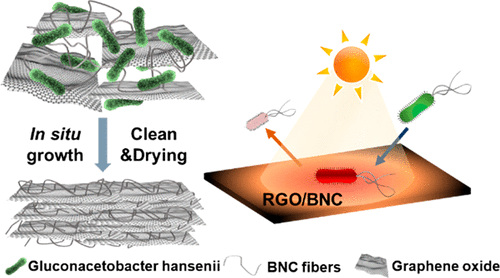A major problem with water purification filtration devices is that, over time, bacteria will accumulate on the surface of the material, causing the effect to gradually deteriorate. However, researchers at Washington University in St. Louis have developed a new type of filtration membrane. It uses graphene to actively kill bacteria to reduce biological pollution. More interestingly, it also flexibly uses the power of bacteria. During manufacturing, the researchers first fed a sugar-containing substance to Gluconacetobacter hansenii. Then, the bacteria will produce nanocellulose in the water.

As the fibers grew, the team also added graphene oxide flakes to increase the stability and durability of the filter membrane. Young-Shin Jun, one of the main co-authors of the study, stated:
This is like using 3D printing of microorganisms, we can add anything we like during the growth of bacterial nanocellulose. We have observed under different pH conditions.
Compared with filter membranes prepared by vacuum filtration or spin coating, the properties of graphene oxide biofilms are more stable.
After using the bacteria, the researchers used an alkaline solution to kill the cellulose-producing acetobacter. At the same time, the oxygen groups are removed, and the graphene oxide is reduced.
The treated graphene biofilm will react to light to kill other bacteria that adhere to the film.
Research co-author Srikanth Singamaneni said that if you want to use microorganisms to purify water, the reduced graphene oxide in the membrane can absorb sunlight, heat the filter and kill bacteria.
To test the sterilization ability of this filter, the researchers exposed it to E. coli.
It was found that only three minutes of light was enough to heat the membrane above 70 ° C (158 ° F), easily killing pests and microorganisms. Under high pressure, the sterilization membrane can filter water at twice the speed of the ordinary membrane.
In contrast, if there is no reduction of oxidized graphene, the prepared filter membrane cannot effectively kill E. coli.
It is worth mentioning that the cost of the new process is relatively low, which helps millions of people in developing countries drink clean drinking water.
Pp Plastic Plywood,Pp Plastic Sheets,Moisture-Resistant Plywood,Versatile Construction Plywood
RILICO , https://www.rilico.com